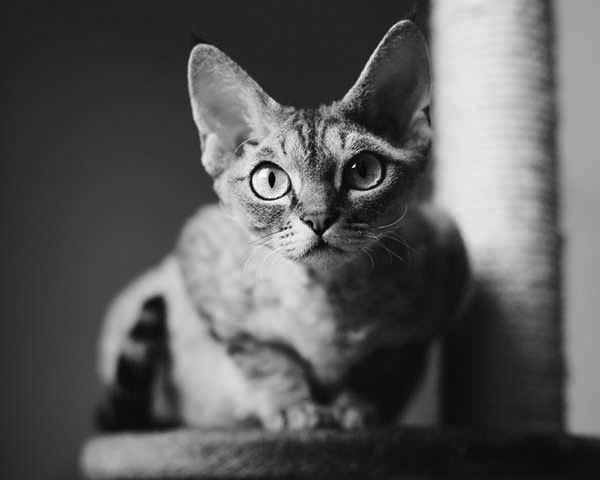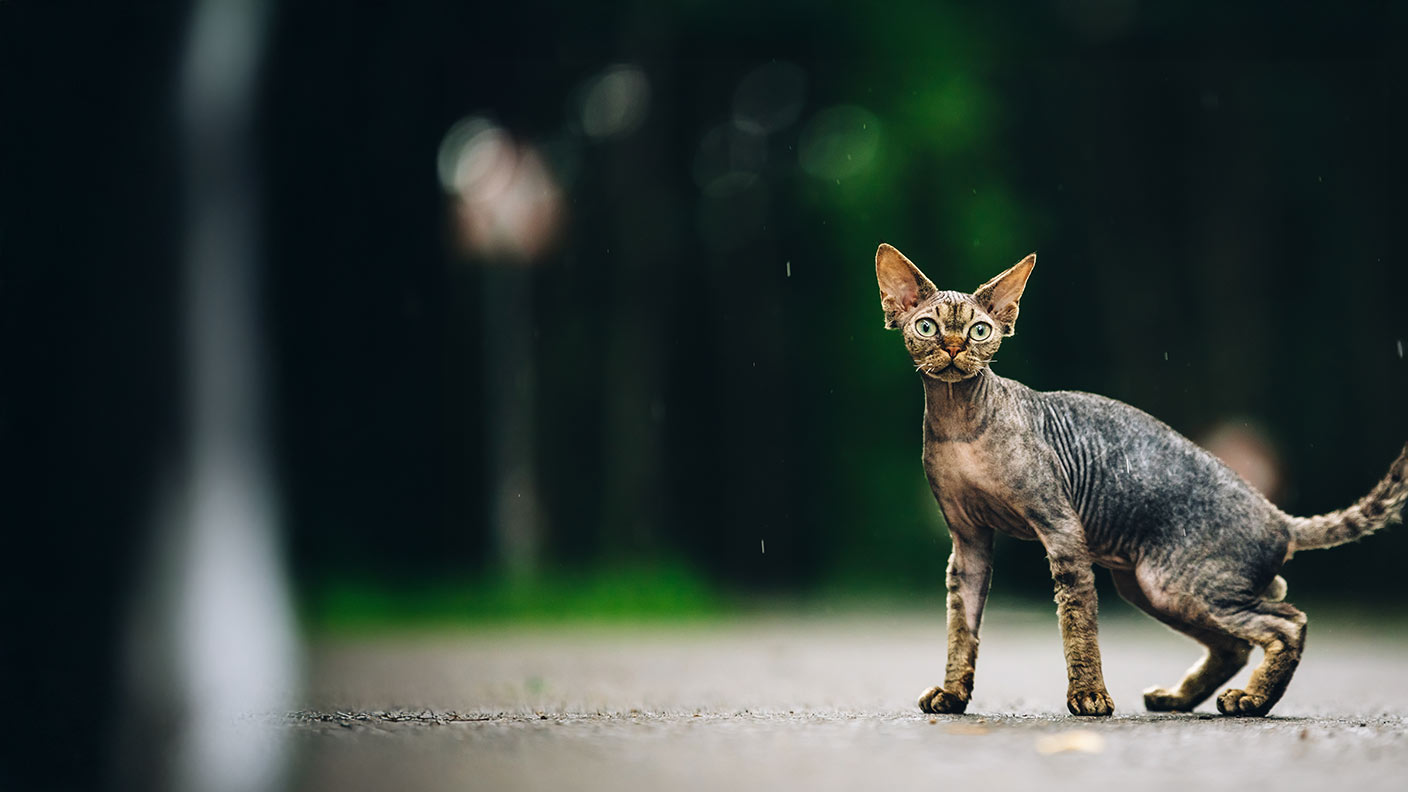Devon Rex cat breed information and advice
With their big eyes and even bigger ears, the Devon Rex is a cute bundle of fur. Often nicknamed poodle cats , Devon Rex cats have distinctive curly coats that are ideal for snuggles.
Devon Rex cats originate from a feral tom cat that lived in an abandoned tin mine in Buckfastleigh, Devon. In 1959, the tom cat fathered a litter of kittens and one of the offspring had the same curly coat as the tom. A breeder took in the kitten and named her Kirlee. At first, the cat was thought to be related to the Cornish Rex, but this was not the case.
The curly coats of Cornish Rex and Devon Rex cats are caused by a different gene. The rex part of the name refers to the mutation that results in a curly or wavy coat.
Devon Rex cat facts

| Lifespan | 12-16 years |
| How much | £500+ |
| Size | small to medium |
| Weight | 2.3 - 4.5 kg |
| Colours | Blue, lilac, calico, black, white, grey, cream, brown, ginger |
| Grooming | low |
| Temperament | lively, mischievous, friendly |
| Exercise | high |
Insurance for your Devon Rex
The Devon Rex cat breed is generally healthy, but a few health problems have been seen in the breed. These include:
Taking out pet insurance for your cat will help with the cost of any treatment that your Devon Rex may require.
Sainsbury’s Bank Pet Insurance
With Sainsbury’s Bank, you can take out a new cat insurance policy once your pet is over 8 weeks old.
There are three types of cover you can get with Sainsbury’s Bank Pet Insurance:
- Lifetime – our most comprehensive plan which can cover £10,000 for pet care each year.
- Maximum benefit – cover for illnesses, accidents and conditions of up to £6,000.
- Time limited – we can cover your Devon Rex for different treatments of up to £3,000, or for 12 months.
As long as you renew your policy each year, you’ll be covered for the duration of your Devon Rex’s life.
Please be aware that we won't cover any pre-existing conditions and that terms, conditions, excesses, exclusions and limitations apply.
How to care for a Devon Rex cat
With a coat that requires little to no grooming, Devon Rex cats are easy to care for. But like all cats, they should have a balanced diet and lots of exercise. It’s also a good idea to check for any gum disease while cleaning their teeth.
Feeding and nutrition
Make sure you feed your Devon Rex cat a nutritious, balanced diet. If you buy your Devon Rex kitten from a breeder try to keep them on the same food and stick to a similar feeding schedule. If you want to change this, do it slowly to avoid upsetting their routine.
Exercise
Devon Rex cats are slender and fairly long in the body. When it comes to cat exercises, they are lively breeds so make sure they have interactive or puzzle toys to keep them from becoming bored. They like to jump so give them a cat tree or perch and you’ll soon find them keeping an eye on everything from up high.
Temperament and behaviour
Devon Rex cats are mischievous. Always alert, they’ll follow their owners around the house and will want to be involved in whatever you’re doing. Whether you’re working, reading a book or preparing dinner, the Devon Rex cat will be there. They’ll perch on your shoulder, curl up on your lap and may even want to snuggle under the duvet with you.
Common health problems
The Devon Rex can have a few breed-related problems in addition to the common health issues that cats can have. Taking out cat insurance for your Devon Rex will mean that these conditions will be covered.
Congenital hypotrichosis
Devon Rex cats can suffer from a decreased or lack of hair. Cats are either born hairless or lose their hair within a few weeks. Affected cats will need sun protection if allowed outside.
Devon Rex myopathy
Devon Rex myopathy is also known as Dystroglycanopathy or Spasticity. Cats affected by this hereditary condition have generalised muscle weakness, head bobbing, and ventroflexion of the neck (where the head is tucked downwards towards the chest). Other signs are high-stepping, fatigue, prominent shoulder blades, and megaoesophagus. This means that the oesophagus becomes floppy and weak. ‘Dog-begging', ‘chipmunk’ or ‘Meercat’ postures may be seen. As it is caused by a genetic mutation, there is no cure. Mildly affected cats can have a long life but for those more severely affected the quality of life may be poor. Some may sadly die after choking on food. There is no specific treatment but feeding on a low platform can help to prevent megaoesophagus. Small rather than large feeds can also help.
Vitamin K1 responsive coagulopathy
Some Devon Rex cats, especially those in Australia and the UK, have been reported to be affected by a reduction in the activity of vitamin K dependent clotting factors. This can cause bleeding in various parts of the cat’s body. Lifelong treatment with Vitamin K1 is needed to enable the cat to lead a good quality of life. Devon Rex cats should be screened with blood tests and cats identified with the condition should not be bred from.
HCM
Hypertrophic cardiomyopathy, commonly known as HCM, is a serious heart condition that can affect many breeds of cats. Cardiomyopathy means disease of the heart muscle and in HCM, the heart muscle becomes abnormally thick. This prevents the heart from working properly, leading to heart failure. Long-term medication can slow the disease down but unfortunately, there’s no cure.
Is a Devon Rex cat right for you?
Devon Rex cats are active and energetic - always entertaining. They love attention and are affectionate with their owner. They’ll fit in with busy households, and families with children, other cats, and cat-friendly dogs. It’s best not to leave them alone for too long though - you don't know what they might get up to. We did say they’re mischievous.
Browse our guides

Choose from our list of helpful guides and information
Explore dog breeds

Find out how to keep your dog healthy and happy
Cat breed guides

How to care for your cat, common health problems and more
Frequently asked questions
Do Devon Rex cats shed hair?
Devon Rex cats will shed hair, but they do have a lower tendency to shed than other cats. The breed is often thought to be a more hypoallergenic cat than other breeds. This doesn’t mean that if you have a cat allergy, you won’t be allergic to Devon Rex cats. But you might be more able to tolerate these cats. Why don’t you arrange to spend some time with a Devon Rex cat to see if you can tolerate the breed?
Terms and conditions
Important information
* Guaranteed discount for Nectar members: The discount is based on information related to you and the transactions you've made with Sainsbury's supermarkets and Sainsbury's Bank using your Nectar card. For more information go to sainsburysbank.co.uk/nectar.
Sainsbury's Bank plc, Registered Office, 33 Charterhouse Street, London, EC1M 6HA (registered in England and Wales, no 3279730) is authorised by the Prudential Regulation Authority and regulated by the Financial Conduct Authority and the Prudential Regulation Authority (register no. 184514).
Sainsbury's Supermarkets Ltd is an appointed representative of Sainsbury's Bank plc. Sainsbury's Bank plc acts as an introducer to Pinnacle Insurance Ltd who is authorised by the Prudential Regulation Authority and regulated by the Financial Conduct Authority and the Prudential Regulation Authority (register number 110866). Registered office: 4th Floor, Limelight, Elstree Way, Borehamwood, Hertfordshire, WD6 1JH. Sainsbury’s Bank Pet Insurance is arranged, administered and underwritten by Pinnacle Insurance Ltd. Sainsbury's Bank plc and Pinnacle Insurance Ltd are not part of the same corporate group.
We do not provide personal recommendations to customers.
References
Content provided from Vetstream's Vetlexicon Felis - https://vetstream.com/treat/felis/freeform/devon-rex
Rosanna Marsella, Ian Mason, David Scarff (online) Congenital hypotrichosis. In: Vetlexicon Felis. Vetstream Ltd, UK. Website: https://www.vetstream.com/treat/felis/diseases/congenital-hypotrichosis.
Laurent Garosi, Leslie A Lyons, Prof Richard Malik (online) Devon Rex myopathy. In: Vetlexicon Felis. Vetstream Ltd, UK. Website: https://vetstream.com/clinical-reference/felis/diseases/devon-rex-myopathy.
Rachel Korman, Severine Tasker (online) Vitamin K1 responsive coagulopathy (Devon Rex). In: Vetstream Ltd, UK. Website: https://vetstream.com/treat/felis/diseases/vitamin-k1-responsive-coagulopathy-(devon-rex).
Serena Brownlie, Phil Fox, Philip K Nicholls, Penny Watson (online) Heart: hypertrophic cardiomyopathy. In: Vetlexicon Felis. Vetstream Ltd, UK. Website: https://www.vetstream.com/treat/felis/diseases/heart-hypertrophic-cardiomyopathy.
Vetstream Ltd (online) Cardiomyopathy in your cat Owner Factsheet. In: Vetlexicon Felis. Vetstream Ltd, UK. Website: https://vetstream.com/treat/felis/owner-factsheets/cardiomyopathy-in-your-cat.
Sorrel Langley-Hobbs, Rosanna Marsella, Susan Rackard (online) Patella: luxation. In: Vetlexicon Felis. Vetstream Ltd, UK. Website: https://www.vetstream.com/treat/felis/diseases/patella-luxation.
